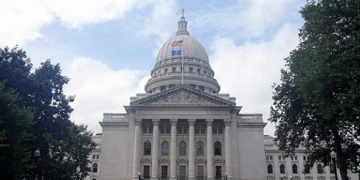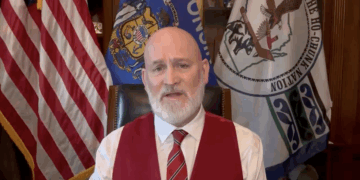Wisconsin Supreme Court Justice Rebecca Bradley has taken aim against her liberal opponent in her race for reelection, Appeals Court Judge Chris Taylor, over Taylor’s opposition to Marsy’s Law, which increased the rights of victims of crime in the state constitution.
In a statement to the Journal Sentinel, Bradley indicated that Taylor opposed the constitutional amendment on two distinct occasions when serving as a state legislator, despite its broad bipartisan support and robust backing from Wisconsin voters.
“Taylor’s extreme political views don’t reflect the values of the people of this state,” Bradley said, arguing that her presence on the Wisconsin Supreme Court would lead to partisan rulings and undermine public confidence in her judgment.
According to the Journal Sentinel, as a Democratic legislator representing Madison, Taylor voted against the proposal in both 2017 and 2019. Subsequently, her campaign treasurer joined a lawsuit contesting the amendment following nearly three-quarters of voters’ approval in 2020. Ultimately, the state Supreme Court ruled 6-1 in favor of the measure’s validity, with even two liberal justices concurring, thereby overturning a lower court’s determination that the wording was ambiguous.
Wisconsin’s version of Marsy’s Law was overwhelmingly approved by voters in April 2020, garnering 75% of the vote. The ballot measure amended the Wisconsin Constitution by building upon a 1993 law that provided crime victims specific rights. Among the rights added to victims were the right to “the timely disposition of any criminal cases”, to be allowed to attend all proceedings and hearings related to the case, and to be notified of updates on the case and the “release, escape, or death of the alleged criminal in a timely manner.”
The ballot measure was largely funded by Henry Nicholas, who started the national Marsy’s Law for All campaign. He named the group in honor of his sister, Marsalee, who was murdered by an ex-boyfriend in 1983 and whose mother “was confronted by her daughter’s murderer” a week after the murder, having not received any notification that the killer had been released on bail. (RELATED: Out-of-State Billionaires Propel Wisconsin Democratic Fundraising Surge)
The amendment faced legal challenges in the years since its enactment, with critics saying it was improperly worded and should have been two separate ballot measures. The District III Court of Appeals sent the question to the Wisconsin Supreme Court in December of 2021, which ruled in May 2023 that the arguments against the amendment were not valid and “does not exist in state law.”
In the five years since Marsy’s Law was secured in Wisconsin, law enforcement and prosecutors’ offices have been using it to assist victims in “mapping out” the legal process and what their rights are. According to the victim witness coordinator for Douglas County, Martina Tendrupe, victims are now less likely “to drop out of the system hallway through” a trial, saying “they feel like they’re being hear more so that maybe they otherwise would.”
The director of Marsy’s Law in Wisconsin, Nela Kalpic, told WKOW earlier this year that the challenge of funding for education and increased awareness has begun to wane, saying that “without adequate funding it becomes much harder to support victims.” (RELATED: Wisconsin State Bar Abandons Race-Based DEI in Legal Settlement)
In May of this year, stakeholders in Wisconsin’s criminal justice system, along with victim service organizations, gathered to collaborate on a project to examine victims’ experiences and identify strengths and gaps in how the system supports them. Led by Marsy’s Law for Wisconsin, the Douglas County District Attorney’s Office, and the Wisconsin Department of Justice, the effort used a “mock case” to map out each stage of the process, highlighting where victims’ rights are upheld and where improvements are needed.
While proponents of the law have called it “a gamechanger” that have assured “victim’s rights are acknowledged”, opponents say it may have gone too far and created conflicting legal doctrines “at the intersection between privacy [of victims] and state law protecting the public’s right to know.” Wisconsin Freedom of Information Council President Bill Lueders told Fox 6 that “Marsy’s Law has been misapplied or over-applied”, citing instances in which the names of a business, not an individual, was withheld or a police officer’s name is not publicly released after having shot an individual potentially involved in a crime.
In the Wisconsin Supreme Court race, Justice Bradley’s criticism of Taylor was amplified by the Wisconsin Republican Party, which released a statement earlier this month saying “Chris Taylor has shown her true colors as a wolf in sheep’s clothing” and “defying the will of 75% of Wisconsinites” who approved the measure.
Bradley and Taylor will face off in next April’s election.
(RELATED: Wisconsin Judge Escalates Showdown Between ICE and ‘Sanctuary County’ Sheriff)
































